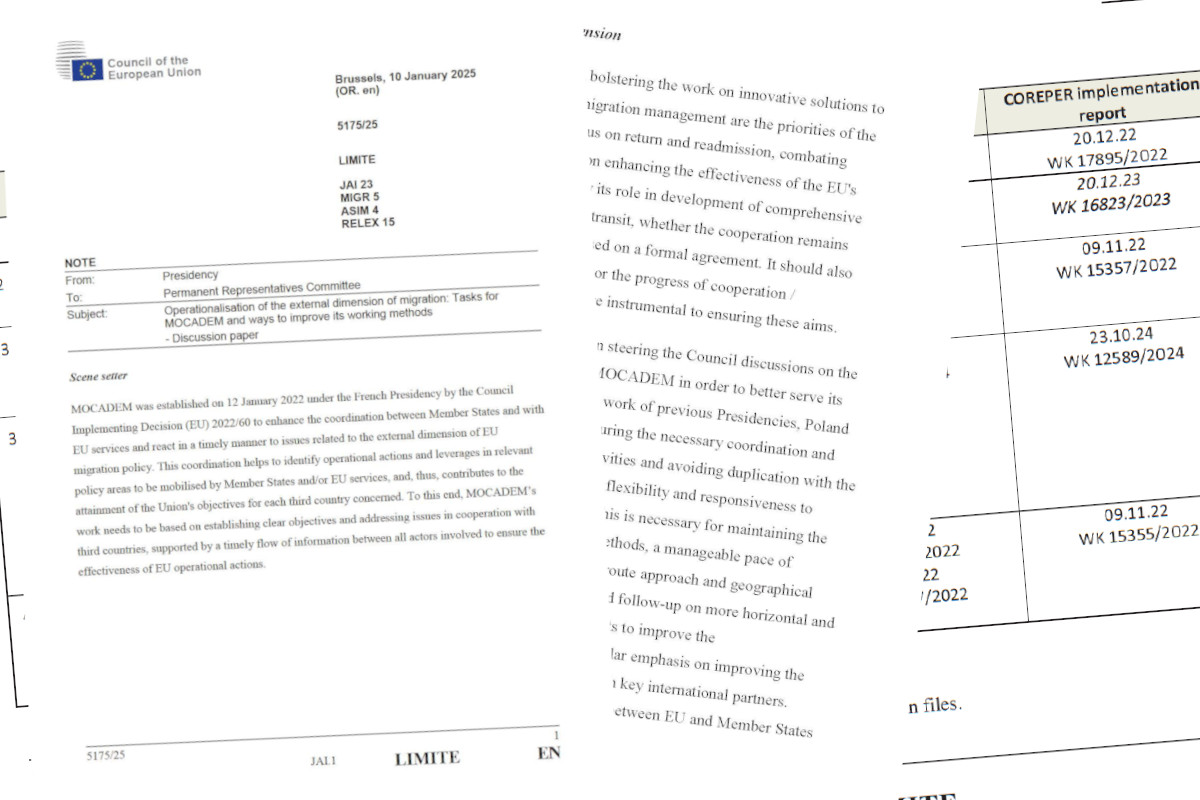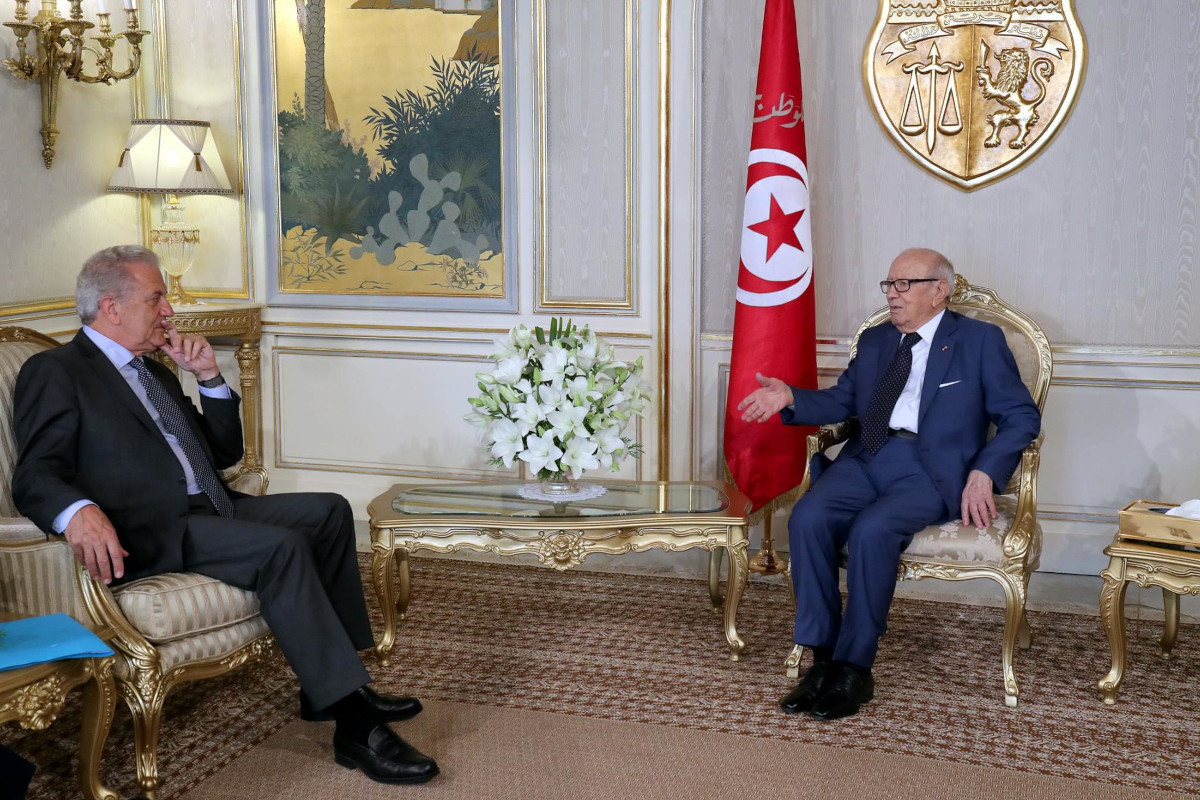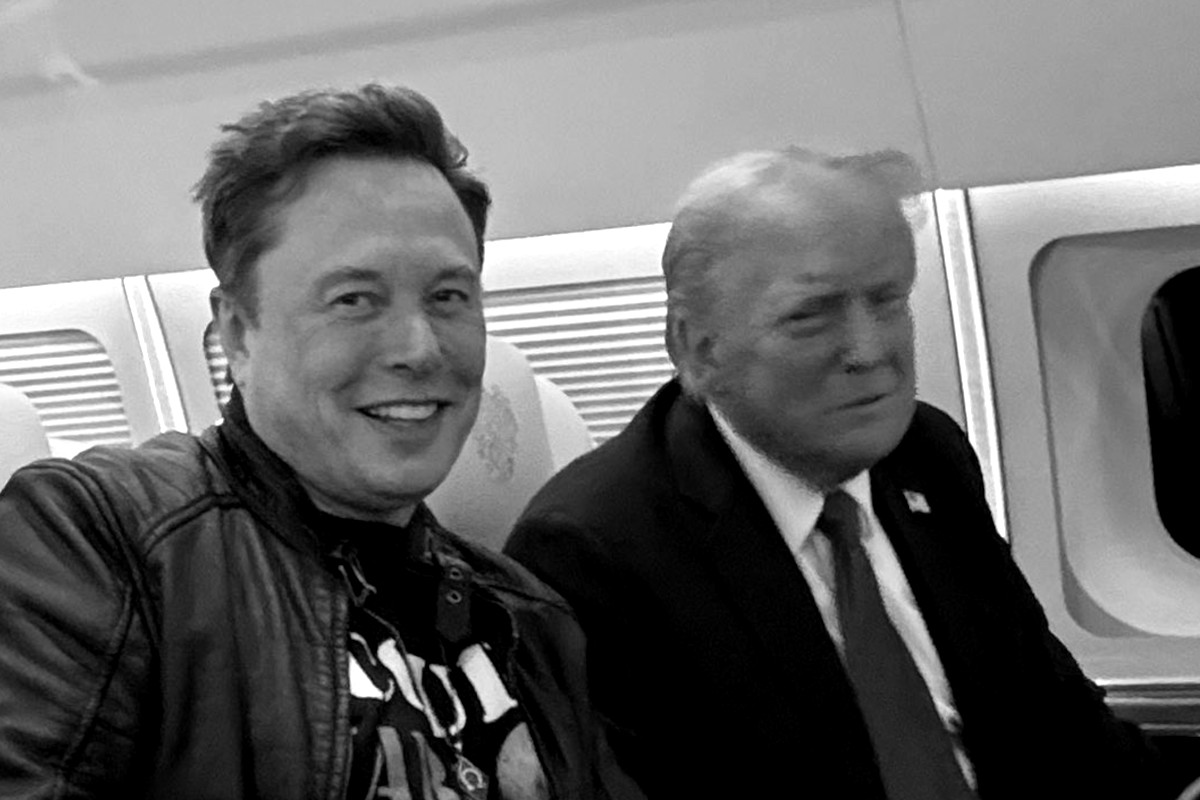EU: Outsourcing borders and migration control: no parliamentary scrutiny in sight
Topic
Country/Region
31 January 2025
EU member states are looking for ways to “improve” the outsourcing of border and migration controls to non-EU countries. This entails more funding for authoritarian regimes, and more violence and abuse against migrants and refugees. A document obtained by Statewatch outlines the key topics of interest to the EU’s secretive “operational coordination mechanism.” Transparency and democratic scrutiny are not on the list.
Support our work: become a Friend of Statewatch from as little as £1/€1 per month.

EU governments’ operational coordination mechanism
One way EU governments work to outsource migration and border controls to non-EU states is through a secretive body known as MOCADEM, the “operational coordination mechanism for the external dimension of migration.”
The abbreviation MOCADEM comes from the French: mécanisme de coordination opérationnelle pour la dimension extérieure des migrations.
Since January 2022, it has produced action plans on 14 different countries and four different regions. These are designed to guide diplomacy and decision-making by EU institutions and member states.
For example, MOCADEM has contributed to Iraq and The Gambia changing their policies on accepting deportations from the EU.
One of MOCADEM’s action plans deals with Tunisia, where the EU has funded violent abuse against migrants and refugees by Tunisian security forces.
The European Commission is now reportedly “fundamentally overhauling how it makes payments to Tunisia,” following press revelations about the abuse.
Statewatch previously revealed that the European Parliament’s lawyers have argued that the deal with Tunisia needs democratic oversight, as do other EU migration deals with “partner” countries.
No parliamentary scrutiny
This lack of parliamentary scrutiny runs counter to the formal role of the Parliament’s civil liberties committee in overseeing EU asylum and migration policies. Yet, the secrecy and lack of scrutiny are set to continue.
A discussion paper obtained by Statewatch (pdf) outlines the next phase of MOCADEM’s work, but makes no mention of national parliaments or the European Parliament.
Belgium’s ambassador to the EU has previously brushed off parliamentary requests for information on MOCDAEM’s activities.
Estrella Galán, a Spanish MEP for The Left and a member of the European Parliament’s civil liberties committee, told Statewatch:
The ongoing lack of transparency, coupled with the absence of effective parliamentary oversight, has facilitated the externalization of borders and the funding of severe human rights violations, including human trafficking and collective expulsions.
Trafficking by the state
Galán’s comments came in the wake of a report launch at the European Parliament detailing even more abuses in North Africa.
The report, State Trafficking, compiles the testimonies of 30 Black people expelled from Tunisia to Libya between June 2023 and November 2024.
A common thread amongst their stories was “the sale of human beings at the border by Tunisian police and military apparatuses,” which the report labels as “state trafficking.”
Black people in Tunisia have routinely been targeted by police officers and soldiers for arbitrary mass arrests. They are detained, transported to the Libya border, and then sold to Libyan militias.
“They left us in the desert. The Libyans came with a package containing money that they handed to the Tunisians. We were like goods. They sold us, we saw it,” said one of the people interviewed for the report.
Galán commented to Statewatch:
The European Commission must immediately halt this barbarity and ensure comprehensive parliamentary scrutiny over MOCADEM, alongside independent investigations, to guarantee that these blatant human rights violations are not allowed to go unpunished.
Improving MOCADEM working methods
The MOCADEM discussion paper was produced by the Polish Presidency of the Council of the EU and was circulated on 10 January to EU member state ambassadors in Brussels.
It is entitled ‘Operationalisation of the external dimension of migration: Tasks for MOCADEM and ways to improve its working methods - Discussion paper’ (pdf).
The paper begins by recounting the history of MOCADEM, previous evaluations and recommendations on its work, and various changes introduced to its working methods in recent years.
It goes on to note that the “external dimension of migration” is a key political priority for the EU.
The European Council, made up of EU heads of state and government, gave the topic “particular attention” in its October and December conclusions, says the document.
The Presidency’s document also refers to the EU’s new “strategic guidelines for legislative and operational planning within the area of freedom, security and justice,” approved in December 2024.
The guidelines assert the need for “ambitious and durable comprehensive partnerships with countries of origin and transit” of migrants.
They also call for “border and security partnerships with our neighbours and with countries globally.”
Tineke Strik, a Dutch MEP for the Greens, is a longstanding critic of the EU’s border externalisation agenda.
She told Statewatch that these plans sit “within the broader trend of Commission and Council to cosy up to and bypass Parliamentary scrutiny when it comes to their shady migration deals it concludes with dictators.”
Those deals often lead to “violence and unsafety for people on the move,” Strik added.
Polish Presidency priorities
The document says that MOCDAEM is “instrumental” to achieving the Polish Presidency’s goals for the next six months.
Those goals are:
- increased cooperation with “key third countries”;
- looking for “innovative solutions to counter irregular migration”; and
- ensuring “effective migration management.”
The Presidency says that MOCADEM should ensure “flexibility and responsiveness to developments,” and reinforce “links with the local level.”
“This is necessary for maintaining the operational nature of MOCADEM and, in terms of working methods, a manageable pace of meetings,” says the paper.
The Presidency wants MOCADEM to focus on the “whole-of-route approach,” referring to different routes used by people to migrate to the EU.
It also emphasises a “whole-of-government” approach. This should put “particular emphasis on improving the efficiency of return procedures and strengthening cooperation with key international partners,” says the paper.
Evidently, this “whole-of-government” approach does not include a role for parliamentary scrutiny.
Documentation
- Operationalisation of the external dimension of migration: Tasks for MOCADEM and ways to improve its working methods - Discussion paper (Council doc. 5175/25, LIMITE, 10 January 2025, pdf)
Our work is only possible with your support.
Become a Friend of Statewatch from as little as £1/€1 per month.
Further reading

Border externalisation: billions of euros, visa sanctions, and a wealth of documentation
The second issue of our bulletin on EU border externalisation policies is now available.

Charting a course through the labyrinth of externalisation
“Migration is a European challenge which requires a European response” has become a favoured refrain of EU officials and communiques. While the slogan is supposed to reinforce the need for a unified EU migration policy, it also masks the reality of the situation. The EU’s response to migration – in particular, irregular migration – is increasingly dependent on non-EU, and non-European states. Billions of euros and huge diplomatic efforts have been expended over the last three decades to rope non-EU states into this migration control agenda, and the process of externalisation is accelerating and expanding. Understanding the institutions and agencies involved is a crucial first step for anyone working for humane EU asylum and migration policies.

“Action file” on Tunisia outlines EU’s externalisation plans
An “action file” obtained by Statewatch lays out the objectives and activities of the EU’s cooperation on migration with Tunisia – whose government was heavily criticized by the European Parliament this week for “an authoritarian reversal and an alarming backslide on democracy, human rights and the rule of law.”
Spotted an error? If you've spotted a problem with this page, just click once to let us know.
